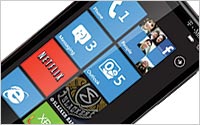Forecast: Windows Phone To Surpass iOS By 2016
- by Mark Walsh @markfwal, June 6, 2012
 A new forecast suggests
Microsoft’s Windows Phone will gain momentum in the coming years, edging out iOS to become the second-most-popular smartphone operating system behind Google’s Android by 2016. That would
mark a dramatic reversal of fortune for the Microsoft platform, which currently has only a fraction of the smartphone market.
A new forecast suggests
Microsoft’s Windows Phone will gain momentum in the coming years, edging out iOS to become the second-most-popular smartphone operating system behind Google’s Android by 2016. That would
mark a dramatic reversal of fortune for the Microsoft platform, which currently has only a fraction of the smartphone market.
Technology research firm IDC predicts Windows Phone will jump from a 5% share of global smartphone shipments in 2012 to 19.2% in four years fueled by 46% annual growth. By contrast, IDC projects Android’s runaway growth will slow to 9.5% annually, and iOS’ to 11%. Android will remain the top smartphone OS, but its share will decrease from a peak 61% this year to 53% in 2016, while iOS holds roughly steady, from 20.5% to 19%.
The same is true for BlackBerry, whose share will remain at about 6% through 2016, supported by demand for affordable messaging devices in emerging markets. Symbian -- only a few years ago the leading smartphone platform -- will all but disappear by 2014 as a result of Nokia’s switch from that Symbian to Windows Phone as the primary OS for its phones.
“What remains to be seen is how these different operating systems -- as well as others -- will define and shape the user experience beyond what we see today in order to attract new customers,” said Ramon Llamas, a senior mobile analyst at IDC.
The firm projects overall mobile phone shipments this year will slip to 1.7 billion from 1.8 billion in 2010 as a result of sluggish global economic conditions and slowing feature phone sales. The 10% drop in regular phone shipments in 2012 will be offset by a 38.8% increase in smartphone shipments to 686 million units.
Falling average selling prices and component costs, subsidized by carriers, and lower-cost data plans are putting smartphones within reach of more people worldwide.
Feature phones, however, will still account for 61.6% of mobile phone shipments in 2012. And IDC forecasts 2.3 billion phones overall will be shipped by the end of 2016.



I hope Mark remembers he wrote this and the editors allow him to write a follow-up in 2016. I bet completely on the other outcome - which is Windows phones are marginal in 2016.